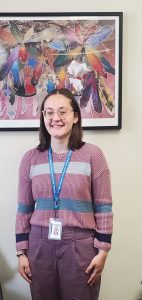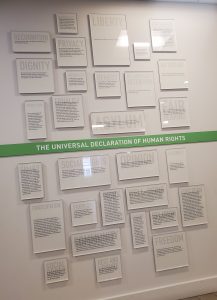
Going into the CAPS Fellowship, I was looking forward to something that would challenge me. There were lots of great options, however, after interviewing with Shannon from Heartland Alliance Health’s Care Coordination program and hearing about their mission and work, I knew that this experience would push my learning in a necessary direction. The field of social work is designed to uplift those most vulnerable in our society to achieve a sense of wellbeing, and I realized that I had never traveled much outside of my “bubble” of studying social work in Northwest Indiana to devoting care and time towards the needs of refugees and immigrants. As someone who aims to amplify diversity, equity, and inclusion, I felt that I still have a lot to learn about cross-cultural experiences.
I was also hoping for more first-hand experience with social services, and with work designed to support others in navigating systems in the U.S. that were never really designed to accommodate everyone. I need to be an active ally, and a team that focuses on case management work for refugees and immigrants with a focus on mental health is a space for me to practice doing so- especially through a learners perspective, trauma informed lens, and strengths based model, which are emphasized on this team.

I already have learned so much from this experience and from the team I have been working with. For one, the case workers at my site exemplify what it means to foster a positive team environment. Each of them come from different cultural backgrounds, most of them immigrants themselves, and each of the four of them speak more languages combined than I can count on two hands. They use these differences to work collaboratively as a team, and to support one another and a wide range of participants from all around the world. The people they serve are referred to as “participants,” as everyone involved in the program acts as a collaborator towards common goals, rather than contributing to a hierarchy of power. You get the feel through the everyday interactions of this team that their work is really a work of heart: they put in the effort because they know that it provides neighbors in their communities with tools and support through their challenges.
I will also mention that I somehow hadn’t given much consideration to the following prior to this experience: case managers work with participants so that they have what they need to maintain a good quality of life on their own. However, mental illness is often chronic and an ongoing part of a person’s whole life. Further, if you were born in the U.S. and native English-speaking, consider how confusing the programs that you or someone you know relies on are, such as the medical system, legal system, and public aid-and now imagine the layers of difficulty that would be added if you are new to the U.S. and English is not your first language. Especially given the trauma refugees and immigrants face, discrimination, and overall difficulty of navigating the U.S., the reality is that it is hard for participants in this program to reach the point of comfortably and confidently ending their services with the Care Coordination Team. Cases are typically longer here than is typical for social work, and this creates an added stressor for the program, as financial supporters for the nonprofit only will fund a case for a certain amount of time.

I’m so lucky to be collaborating with such an incredible team this summer, and am feeling inspired and challenged by the team I have become a part of for the next few weeks. I can say that I am actively learning, both professionally and personally from my experiences. I am participating in activities such as shadowing professionals, hearing the stories of participants and their unfathomable resilience and challenge, performing administrative tasks, coordinating appointments and special events, accompanying participants, and staying curious as to how I can play a role in uplifting others.
– Cylia Srmek, Heartland Alliance Health